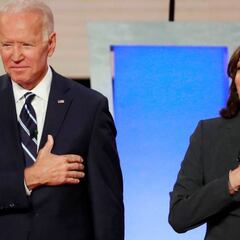Third stimulus check: who would be eligible under Joe Biden’s proposal?
Joe Biden released his American Rescue Plan which includes a $1400 stimulus check, expanding access to groups that missed out on the previous payments.

On Thursday President-elect Joe Biden released his $1.9 trillion American Rescue Plan, “the first step of an aggressive, two-step plan for rescue, and recovery” from the coronavirus induced economic crisis. In his proposal he calls for another round of direct payments to Americans to “help hard-hit households cover expenses, spend money at local businesses in their communities, and stimulate the economy.”
The third stimulus check would be a $1400 top-up to the $600 stimulus checks that were approved in December to reach the $2000 total that has been pushed for. By raising the payment size, more Americans could be eligible to receive at least a partial payment than in the first and second round. Biden’s plan also expands eligibility for the stimulus payments to groups that were left out of the previous two rounds of payments.
Expanded eligibility for a third round of stimulus payments
Two key groups missed out on the first round of $1200 payments, adult dependents and mixed status families, the former on the second round as well. Joe Biden’s proposal would see that these two groups get the new payment and have access to the previous payments they are entitled to under the CARES Act.
Adult dependents will get a stimulus check
Both previous stimulus bills only allowed taxpayers to collect direct payments for dependent children under the age of 17. The CARES Act passed in March gave households $500 per qualifying child in addition to $1200 per adult. The $900 billion relief package passed in December sent each household $600 for each eligible adult and child.
Under the American Rescue Plan the age limit for dependents is removed giving access to payments to an estimated 15 million older children and adult tax dependents. This will include children of all ages with disabilities, college students and older high school students as well as older adult relatives that taxpayers claim as dependents on their tax filings.
President-Elect Biden's COVID rescue plan will begin to provide our people with much-needed support, such as $2,000 direct payments and a $15 minimum wage.
— Bernie Sanders (@SenSanders) January 15, 2021
I look forward to working with him and my colleagues in Congress to urgently provide bold relief to working families. pic.twitter.com/i8wS5180bB
Mixed status households will get a stimulus check
A mixed status household has at least one person who is not a US citizen or resident alien (Green Card holders). For example, a US citizen is married to a non-resident alien spouse (an undocumented immigrant). Or both the parents of a child born in the United States, are not US citizens or resident aliens, but the child has a Social Security number (SSN) and is a US citizen.
Under the CARES Act only US Citizens and resident aliens, both of which should have a Social Security number, were entitled to a $1200 stimulus check and the $500 per child. However mixed status households didn’t receive either of those payments affecting an estimated 15 to 17 million people, half of which were children. In the relief package passed in December these families were included to receive both the $600 direct payment per adult and child with an SSN and the previous stimulus payment.
Biden’s plan does not specify if mixed status households with US citizen children but undocumented parents would receive the $1400 payment for adults.
What are the chances of Biden’s plan passing?
When and if the American Rescue Plan could be passed into law in its entirety is yet to be seen. The plan has encountered resistance from within the Democratic party on both sides of the coin. The Republican party will baulk at the price tag although members did push for expanded stimulus payments in the run-up to the Georgia runoff elections.
The Democrats will soon control the Senate when the two Senators-elect from Georgia, Jon Ossoff and Rev. Raphael Warnock, are sworn in. The Senate will be split evenly 50-50, but then-Vice President Kamala Harris will be the tiebreaking vote. Using “reconciliation” the Democrats only need a simple majority to pass any new stimulus legislation.
Senator Joe Manchin has expressed concern about the cost of a third stimulus check and it going to higher-end earners. He wants more money focused on those that need it most. On the opposite end, the more progressive wing of the party is pushing for larger direct payments to Americans. Alexandria Ocasio-Cortez has said "$2,000 means $2,000. $2,000 does not mean $1,400.”
Unemployment benefits should be retroactive too. https://t.co/WRIiBAe0NY
— Alexandria Ocasio-Cortez (@AOC) January 15, 2021
Related stories

Third stimulus check: will be there a new round of payments?
Senator Bernie Sanders, an independent who caucuses with the Democratic Party, will be a gatekeeper as the Chairman of the Budget Committee in the Senate. He has pushed for larger stimulus payments and will be able to influence the size of any spending bill that leaves his committee.
With the narrow balance of power Biden may need the help of Republican Senators to move forward any new stimulus spending should one of the Democratic Senators oppose part of his plan.

